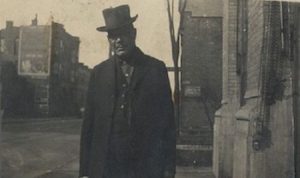
William D. Foster
*This date in 1884 is celebrated as the birth date of William D. Foster. Sometimes referred to as Bill Foster, he was a pioneering Black film producer born in Chicago, Illinois.
He started his career as a sportswriter for the Chicago Defender, writing under the name Juli Jones. Foster periodically wrote for other newspapers as well. Still, under the pen name Juli Jones, including an article for the Indianapolis Freeman published in 1913, in which he "sketches out the public disclosure on the representation of blacks in white-produced films, a disclosure that would define the terms of the debate for the rest of the century ."
In addition to being a writer, Foster was a press agent for vaudeville stars such as Bert Williams and George Walker (vaudeville) and also worked as a booking agent and business manager for Chicago's Pekin Theater. With these connections, he had his foot in the theater industry door years before starting his own film company. The movie industry was still new to the media world and offered the potential for people to get involved.
William Foster took hold of this growing industry and quickly made his mark. In 1910, he founded the Foster Photoplay Company. Foster stated that the film industry "is the Negro businessman's only international chance to make money and put his race right with the world." His goal was for business success and to show that African Americans could improve their image and standing worldwide.
From the start, Foster intended to leave his mark on the film industry and impact the culture of his time and the future culture. The Foster Photoplay Company helped establish the tradition of black comedies and established Foster's place in the film industry. The short films he produced and directed showcased all-black casts with a positive outlook on the black culture and the black community to correct the negative images prevalent in Hollywood.
The Foster Photoplay Company produced four films, the most notable being The Railroad Porter, made in 19madeFoster's most financially successful movie. The movie premiered in Chicago at the States and Grand Theater and instantly succeeded. After The Railroad Porter was released, Foster used his connections as a press agent at the Pekin Theatre to get black film stars to play in his short films. In 1913, Foster produced three more silent shorts: The Fall Guy was another slapstick comedy like The Railroad Porter, The Butler was a detective story, and The Grafter and the Maid was Foster's only melodrama.
He worked to produce comedies that would appeal to a wide range of viewers, but his use of an all-black cast, director, producer, and crew was significant. More black production companies started in Chicago before the coming of sound than in any other city. In 1914, Foster went on a tour to promote his three films released in 1913: The Fall Guy, The Butler, and The Grafter and the Maid. Along with those releases, The Railroad Porter was also promoted by Lottie Grady. Foster's company eventually folded due to distribution problems. In 1915, the Lincoln Motion Picture Company came into being, building on Foster's groundwork to produce various films, including The Realization of a Negro's Ambition in 1916 and The Trooper of Company K in 1917. William D. Foster died in Chicago, Illinois, on April 15, 1940.